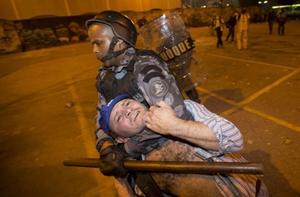World Cup securityWorld Cup security teams focus more on crime, protests – less on terrorism
During the 2014 FIFA World Cup, currently being held across twelve different venues across Brazil, security teams have extensively prepared for measures to be taken against crime and protest related to heated political unrest. American bomb-busting robots, Israeli surveillance drones, and German anti-aircraft tanks — an international assortment of security officials and measures – are just some of the pieces of the greater security apparatus protecting both players and fans.

Brazilian security stresses protestors over terrorists // Source: baomoi.com
During the 2014 FIFA World Cup, currently being held across twelve different venues across Brazil, security teams have extensively prepared for measures to be taken against crime and protest related to heated political unrest.
As NBC News reports, American bomb-busting robots, Israeli surveillance drones, and German anti-aircraft tanks — an international assortment of security officials and measures – are just some of the pieces of the greater security apparatus protecting both players and fans.
Due to the hundreds of thousands of fans — including up to 90,000 Americans — which have descended on cities such as Sao Paulo and Rio de Janeiro, the country’s typical problems with protesters, thieves, and drug-traffickers will only be heightened.
Liliana Ayalde, the U.S. ambassador to Brazil, told the network, “This is crunch time. It’s busy. We’re preparing very carefully and trying to predict as much as we can so that we can be ready for our main responsibility, which is all the fans that are coming down from the States.”
The Brazilian government itself has spent an estimated $855 million to maintain order at the games. Manpower includes undercover police officials throughout various protest groups and soccer hooligan contingents, as well as teams of bomb-sniffing and detection groups and a highly wired and technologically developed intelligence apparatus.
Surprisingly, much of this comes in the wake of a U.S. State Department report which confirmed that “Brazil is a non-aligned country with no significant enemies and is not targeted by any known radical groups.” All the focus has been trained on the civilian population.
Such maneuvering comes in the wake of tensions that escalated in events such as 2013’s Confederations Cup in Brazil, in which roughly one million protesters fought in the streets with police. Eight people were killed. Other sports-related attacks such as the 2010 suicide bombings in Kampala, Uganda during the 2010 World Cup and an attack at the UEFA Champions League Final in Nigeria, both loom in the mind of security and government officials who are preparing for the worst.
The games are scheduled to continue until 13 July.
